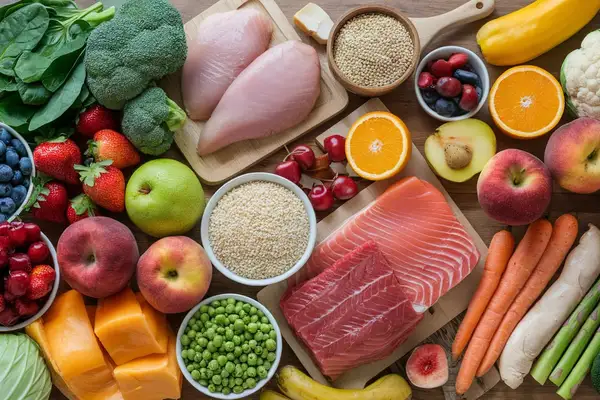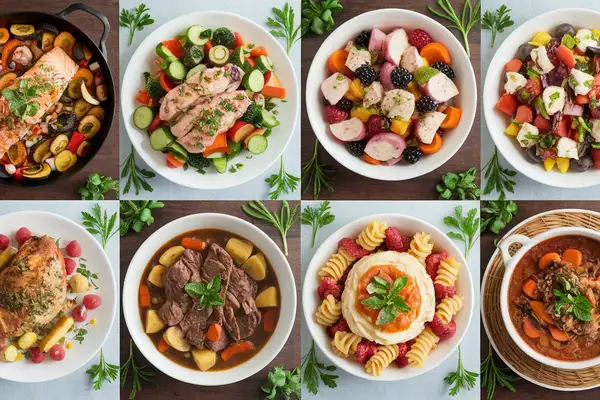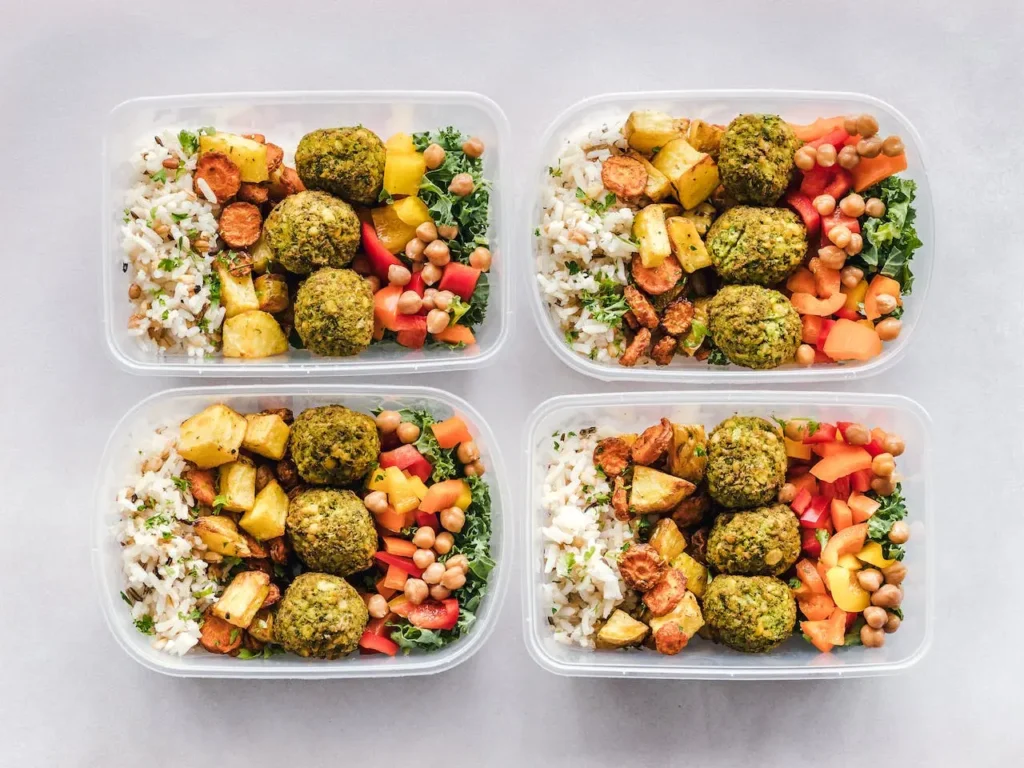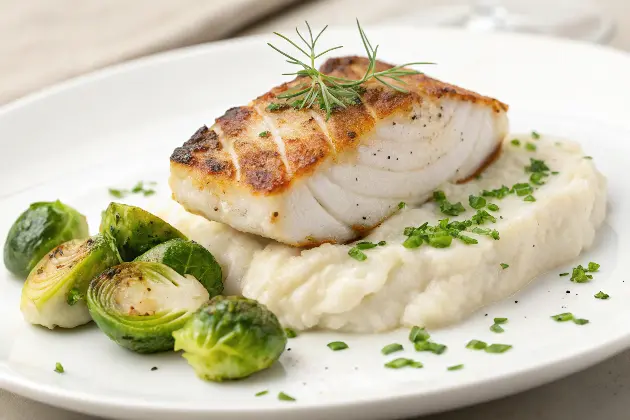7-Day Vegan Meal Plan | High Protein Vegan Diet
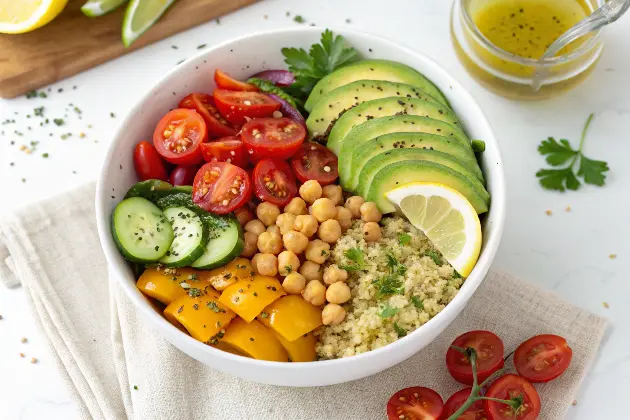
This post may contain affiliate links, meaning I may earn a commission if you make a purchase, at no extra cost to you. I only recommend products I trust. Thank you for your support.
A vegan diet is a type of diet that includes only plant based foods and completely avoids all animal products.
People follow vegan diets for different reasons, such as health, animal rights, or environmental concerns.
It can be very healthy when planned well, especially when it includes a variety of whole foods and enough sources of key nutrients like protein, iron, and vitamin B12.
This 7-day vegan meal plan is designed to provide you with a balanced and nutritious wholesome plant based foods while excluding all animal-derived products, such as meat, dairy, and eggs.
This high protein vegan meal plan will help you to kickstart your vegan challenge by proving you with a detailed grocery list of vegan diet foods and vegan recipes.
7-Day Vegan Meal Plan High Protein (Vegan Menu)
This 7-day vegan meal plan features wholesome plant based foods and high protein vegan recipes designed to boost energy levels and keep you feeling full and satisfied throughout the day.
This high protein vegan diet is perfect for beginners to kickstart the 7 day vegan challenge, and provides a variety of easy vegan meals throughout the week, ensuring a balanced intake of macronutrients and essential vitamins and minerals.
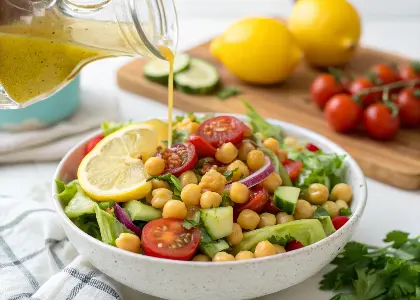
Day 1
Breakfast
- Tofu Scramble: Crumble tofu in a pan and sauté with veggies and spices until cooked through (Approx. 300 calories, 20g protein, 10g carbs, 18g fat).
Lunch
- Falafel Salad with Lemon-Tahini Dressing: Falafel, mixed greens, cucumber, cherry tomatoes, red onion, olives, tahini, lemon juice, garlic, salt, pepper (Approx. 450 calories, 18g protein, 40g carbs, 25g fat)
Dinner
- Chickpea Stir-Fry: Sauté mixed veggies ( bell peppers, broccoli, carrots) and chickpeas in soy sauce until tender (Approx. 450 calories, 20g protein, 60g carbs, 12g fat)
Snack
- Hummus and Veggie Sticks: Homemade or store-bought hummus, carrot, and celery sticks (Approx. 200 calories, 5g protein, 20g carbs, 12g fat).
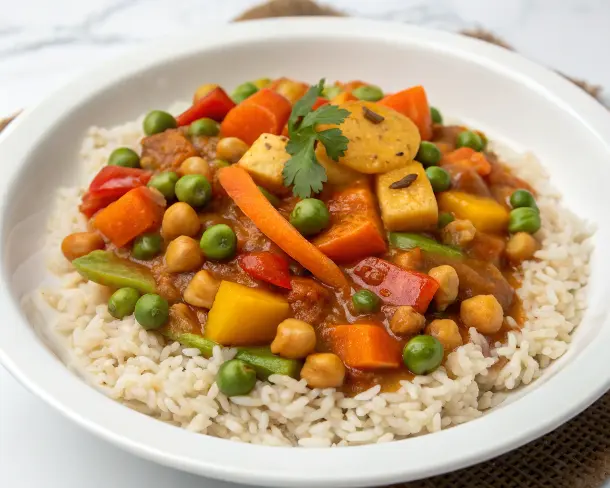
Day 2
Breakfast
- Vegan Protein Smoothie: Blend plant-based protein powder, almond milk, banana, frozen berries, and spinach until smooth (Approx. 350 calories, 25g protein, 40g carbs, 10g fat).
Lunch
- Chickpea Curry with 1 cup Basic Quinoa: Sauté chickpeas, coconut milk, curry spices, onion, garlic, ginger, and tomatoes and serve over cooked quinoa (Approx. 450 calories, 18g protein, 60g carbs, 15g fat).
Dinner
- Garlicky Ginger Eggplant: Sauté eggplant with garlic, ginger, soy sauce, sesame oil, green onions, sesame seeds (Approx. 350 calories, 8g protein, 30g carbs, 20g fat).
Snack
- Trail Mix: Almonds, walnuts, pumpkin seeds, dried cranberries, dark chocolate chips (Approx. 250 calories, 8g protein, 20g carbs, 15g fat).
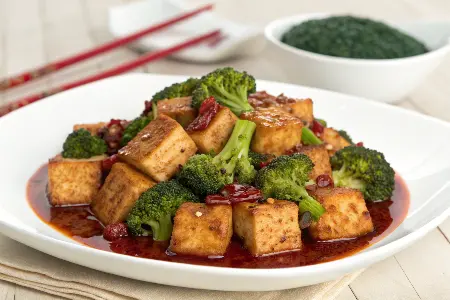
Day 3
Breakfast
- Vegan Pancakes: Mix whole wheat flour, almond milk, baking powder, plant-based protein powder, and maple syrup and cook on a griddle. Serve with syrup (Approx. 400 calories, 15g protein, 50g carbs, 12g fat).
Lunch
- Spaghetti Squash with Peanut Sauce & Edamame: Roast spaghetti squash, prepare peanut sauce by mixing peanut butter, soy sauce, maple syrup, garlic, ginger, lime juice, and red pepper flakes, toss cooked squash with sauce and edamame, garnish with cilantro (Approx. 400 calories, 18g protein, 45g carbs, 20g fat).
Dinner
- General Tso’s Tofu with Broccoli: Coat tofu in cornstarch, fry until crispy, sauté with sauce, and serve with steamed broccoli (Approx. 400 calories, 20g protein, 35g carbs, 15g fat).
Snack
- Edamame Beans: Steamed edamame, sprinkled of sea salt (Approx. 150 calories, 12g protein, 10g carbs, 6g fat).
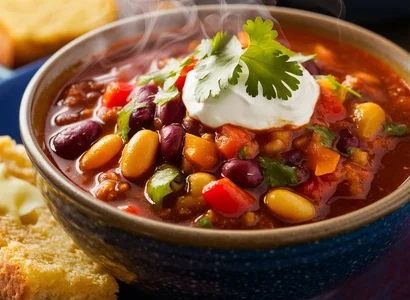
Day 4
Breakfast
- Oatmeal with Nut Butter: Cook oats with almond milk, top with nut butter and banana (Approx. 350 calories, 10g protein, 50g carbs, 12g fat)
Lunch
- Vegan Chili: Simmer kidney beans, diced tomatoes, onions, garlic, chili powder, cumin, paprika, salt, and pepper (Approx. 380 calories, 18g protein, 50g carbs, 10g fat)
Dinner
- Vegan Stir-Fry Noodles: Cook rice noodles, stir-fry tofu and veggies with sauce, toss with noodles (Approx. 450 calories, 20g protein, 60g carbs, 15g fat)
Snack
- Rice Cakes with Almond Butter: Rice cakes, almond butter (Approx. 200 calories, 5g protein, 25g carbs, 10g fat)
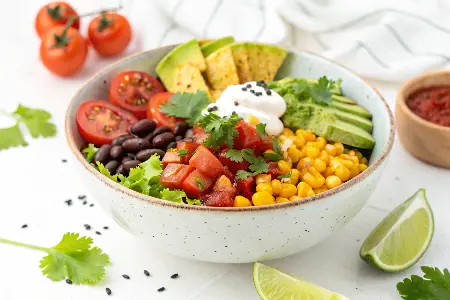
Day 5
Breakfast
- Vegan Protein Waffles: Mix plant-based protein powder, oat flour, almond milk, baking powder, cook in a waffle iron, and serve with fruit (Approx. 350 calories, 15g protein, 40g carbs, 12g fat).
Lunch
- Quinoa Salad with Chickpeas: Mix cooked quinoa, chickpeas, cherry tomatoes, cucumber, red onion, parsley, lemon juice, olive oil, salt, and pepper (Approx. 420 calories, 20g protein, 55g carbs, 15g fat).
Dinner
- Vegan Taco Bowl: Layer brown rice, black beans, corn, diced tomatoes, avocado, lettuce, salsa, vegan cheese (Approx. 450 calories, 15g protein, 70g carbs, 10g fat).
Snack
- Apple Slices with Almond Butter: Fresh apple slices, almond butter (Approx. 200 calories, 4g protein, 30g carbs, 10g fat).
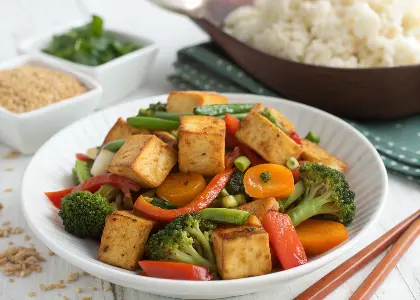
Day 6
Breakfast
- Vegan Breakfast Burrito: Fill whole wheat tortilla with scrambled tofu, black beans, diced potatoes, and salsa (Approx. 400 calories, 20g protein, 50g carbs, 15g fat).
Lunch
- Spicy Cucumber Salad with Cilantro & Peanuts: Slice cucumber, and toss with chopped peanuts, cilantro, red chili flakes, lime juice, soy sauce, and sesame oil (Approx. 200 calories, 5g protein, 15g carbs, 15g fat).
Dinner
- Stir-fried Tofu and Vegetables: Sauté tofu cubes with mixed vegetables (bell peppers, broccoli, carrots) in soy sauce and sesame oil until tender (Approx. 350 calories, 20g protein, 30g carbs, 15g fat).
Snack
- Homemade Protein Bars: Mix rolled oats, protein powder, almond butter, maple syrup, and dark chocolate chips, and shape into bars (Approx. 200 calories, 10g protein, 20g carbs, 10g fat).
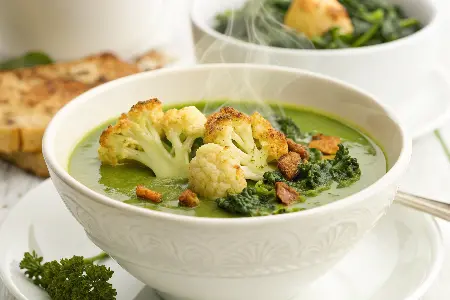
Day 7
Breakfast
- Chia Seed Pudding: Mix chia seeds with almond milk, vanilla extract, and maple syrup, refrigerate overnight and top with fruit (Approx. 300 calories, 8g protein, 30g carbs, 15g fat).
Lunch
- Green Salad with Edamame & Beets: Mix mixed greens, cooked edamame, roasted beets, and a light vinaigrette (Approx. 300 calories, 12g protein, 35g carbs, 15g fat).
- Vegan Carrot Salmon: Marinate thinly sliced carrots in a mixture of soy sauce, liquid smoke, nori, and maple syrup, then roast until tender (Approx. 200 calories, 3g protein, 20g carbs, 10g fat).
Dinner
- Roasted Cauliflower & Algae Soup: Roast cauliflower florets, blend with vegetable broth and algae (spirulina or seaweed), and season to taste (Approx. 250 calories, 10g protein, 20g carbs, 12g fat).
- Artichoke Crab Cakes: Mix artichoke hearts, breadcrumbs, vegan mayo, and Old Bay seasoning, form into patties, and pan-fry until golden (Approx. 300 calories, 10g protein, 30g carbs, 15g fat).
Snack
- Flax Egg: Mix ground flaxseed with water and let sit until gel-like, used as an egg substitute in baking (Approx. 40 calories, 1.5g protein, 3g carbs, 3g fat).
Grocery List for a 7-Day Vegan Meal Plan
Here’s a comprehensive grocery list to help you stock up on all the essential vegan diet foods you’ll need for your 7-day vegan meal plan.
Here is a grocery list that covers a wide range of vegan diet foods:
1. Fruits
- Apples
- Bananas
- Oranges
- Berries (Strawberries, Blueberries, Raspberries)
- Mangoes
- Pineapples
- Kiwi
- Watermelon
2. Vegetables
- Spinach
- Broccoli
- Kale
- Carrots
- Bell Peppers
- Zucchini
- Cauliflower
- Cabbage
- Romaine Lettuce
- Carrot Salmon
- Artichoke Crab Cakes
- Tomatoes
- Onions
3. Grains
- Quinoa
- Brown Rice
- Oats
- Barley
- Buckwheat
- Whole Wheat Pasta
- Millet
4. Legumes
- Lentils
- Chickpeas
- Black Beans
- Kidney Beans
- Soybeans
- Peas
- Edamame
5. Nuts and Seeds
- Almonds
- Walnuts
- Chia Seeds
- Flaxseeds
- Sunflower Seeds
- Pumpkin Seeds
- Cashews
- Pistachios
- Flax Egg
6. Plant-based Protein
- Tofu
- Tempeh
- Seitan
- Plant-based protein powders (Pea protein, Hemp protein)
7. Dairy Alternatives
- Almond Milk
- Soy Milk
- Coconut Milk
- Oat Milk
- Cashew Cheese
- Coconut Yogurt
- Almond Butter
8. Healthy Fats
- Avocado
- Olive Oil
- Coconut Oil
9. Herbs and Spices
- Basil
- Cilantro
- Turmeric
- Cumin
- Paprika
- Oregano
- Garlic
- Ginger
10. Sweeteners
- Pure Maple Syrup (No additives)
- Agave Nectar
- Date Syrup (Non-GMO, Gluten Free, and Dairy Free)
Foods to Avoid on a Vegan Diet
While following a vegan meal plan, it’s important to steer clear of certain foods that are not part of a plant-based diet.
Here is a complete list of vegan diet foods to avoid:
1. Meat
- Red meat (beef, lamb, goat, bison, etc.)
- Poultry (chicken and turkey)
- Pork (pig)
- Insects/bugs (Grasshoppers)
2. Seafood
- Fish (salmon, tuna, etc.)
- Shrimp, octopus, clam, etc.
3. Dairy
- Milk
- Cheese
- Sour cream
- Whipped cream
- Butter
4. Eggs
- Eggs of any animal (even if free-range)
5. Any other animal products or ingredients
- Certain artificial ingredients
- Honey
- Milk powder
- Red food dye
- Gelatine
- Certain alcoholic drink brands
Health Benefits of Vegan Diet
Adopting a vegan diet can provide numerous health benefits, including:
- Improved heart health: A plant-based diet is typically low in saturated fat and cholesterol, which can help reduce the risk of heart disease.
- Reduced risk of type 2 diabetes: Vegan diets have been shown to improve insulin sensitivity and lower blood sugar levels.
- Increased weight loss: Vegan diets are often lower in calories and higher in fiber, which can promote healthy weight loss.
- Reduced inflammation: Plant-based foods are rich in antioxidants and anti-inflammatory compounds, which can help alleviate chronic inflammation.
- Enhanced gut health: A diverse plant-based diet supports a healthy gut microbiome, which is essential for overall well-being.
- Decreased arthritis pain: Vegan diets based on antioxidant-rich whole foods may significantly decrease symptoms of osteoarthritis and rheumatoid arthritis.
Health Risks of Vegan Diet
While a vegan diet can be highly beneficial, it’s important to be aware of potential health risks, such as:
- Nutrient deficiencies: Vegans may be at risk of deficiencies in certain nutrients, such as vitamin B12, iron, calcium, and omega-3 fatty acids, if their diet is not properly planned.
- Protein deficiency: Ensuring adequate protein intake can be a challenge for some vegans, especially if they don’t include a variety of protein-rich plant-based foods in their diet.
- Bone health issues: Vegans may have a higher risk of osteoporosis if they don’t consume enough calcium and vitamin D.
- Digestive issues: The high fiber content of a vegan diet can sometimes lead to bloating, gas, or other digestive discomforts, especially during the initial transition.
- Muscle weakness: Inadequate protein intake can affect muscle mass and strength, particularly in older adults or those engaging in regular physical activity.
- Hormonal imbalance: Soy products, which are a common protein source in vegan diets, contain phytoestrogens that may affect hormonal balance if consumed in excessive amounts.
Vegan Meal Planning Tips
Here are some tips to help you plan and execute your vegan meal plan successfully:
- Meal Prep: Set aside time on the weekend to prepare components of your meals, such as cooked grains, roasted vegetables, or pre-portioned snacks.
- Ensure Variety: Include a wide range of fruits, vegetables, grains, legumes, nuts, and seeds to ensure you’re getting a variety of nutrients.
- Batch Cooking: Cook large quantities of grains, beans, and vegetables to use throughout the week.
- Experiment with New Recipes: Explore new vegan recipes and ingredients to keep your meals exciting and diverse.
- Prioritize Protein: Ensure you’re getting enough plant-based protein by including legumes, tofu, tempeh, and nuts and seeds in your meals.
- Get Enough Vitamin D: Aim for regular, safe sun exposure, or consider a vitamin D supplement, especially in the winter months or if you have limited sun exposure.
- Stay Hydrated: Drink plenty of water throughout the day to support your overall health and digestion.
- Essential Nutrients: Consider supplements for nutrients that are difficult to obtain from food alone, such as vitamin B12, vitamin D, and omega-3s.
Conclusion
Adopting a vegan meal plan can be a highly rewarding and healthful choice when approached thoughtfully and with proper meal planning.
By ensuring a variety of foods, focusing on key nutrients, and incorporating a balance of macronutrients, you can create vegan meals that are not only delicious but also nutritionally complete.
While a vegan diet offers numerous health benefits, such as improved heart health, weight management, and a lower risk of certain chronic diseases, it’s essential to be mindful of potential nutrient deficiencies and take proactive steps to prevent them.
Utilizing a combination of whole foods, fortified products, and, if necessary, supplements, can help maintain optimal health.
Additionally, practical strategies like meal prepping, reading labels, and staying informed about nutrition can ease the transition and make maintaining a vegan lifestyle more manageable.
With this comprehensive 7 day vegan meal plan and vegan diet list of foods, you’ll have the tools you need to embark on your vegan journey with confidence and ease.
So whether you are new to veganism or looking to start the 7 day vegan challenge or vegan weight loss meal plan, this vegan meal plan and vegan meal planning tips will help you enjoy the full benefits of a vegan diet.
- High-protein vegetarian meals
- 7-day Dukan diet meal plan
- 7-day keto diet meal plan
- BRAT diet for adults
- Gluten free diet meal plan
- 7-day low-sodium diet meal plan
- 7-day meal plan for low potassium diet
- 7-day high protein meal plan for weight loss
- 7-day elimination diet meal plan
- Kelly Clarkson’s weight loss diet
- Taylor Swift’s diet and workout plan
- Christmas party food ideas buffet
- Why paleo diet is unhealthy?
- Foods to avoid while on Saxenda
- 7-day diet plan for acid reflux
- Does Ozempic need to be refrigerated?
- 17 foods to avoid while breastfeeding
- Can dogs eat acorns?
- Can dogs eat avocado?
FAQs
What happens to your body when you go vegan for a week?
Going vegan for a week can have several positive effects on your body. You may experience increased energy levels, improved digestion, reduced inflammation, and even weight loss.
However, it’s important to ensure you’re meeting your nutritional needs during this transition.
How much weight can you lose on a vegan diet in a week?
On average, a vegan diet can lead to a weight loss of 1-2 pounds per week, though some individuals may see more significant results in the first week.
Are bananas good for vegans?
Yes, bananas are an excellent food choice for vegans. They are a good source of carbohydrates, fiber, and various vitamins and minerals, such as vitamin B6, manganese, and potassium.
Bananas can be enjoyed in a variety of vegan-friendly ways, such as in smoothies, oatmeal, or as a snack.
Can vegans eat rice?
Absolutely! Rice is a staple food that is entirely vegan-friendly. Whether it’s white rice, brown rice, or even specialty varieties like basmati or wild rice, they can all be enjoyed as part of a balanced vegan diet.
Is tofu a vegan food?
Yes, tofu is a vegan food. Tofu is made from soybeans and is a popular protein source for many vegans and vegetarians. It can be used in a variety of vegan dishes, from stir-fries and curries to desserts and baked goods.
What foods are good for vegan weight loss?
Some excellent vegan foods for weight loss include:
1. Leafy greens (spinach, kale, arugula)
2. Cruciferous vegetables (broccoli, cauliflower, Brussels sprouts)
3. Berries (blueberries, raspberries, strawberries)
4. Legumes (lentils, chickpeas, black beans)
5. Whole grains (quinoa, brown rice, oats)
6. Nuts and seeds (almonds, chia seeds, flaxseeds)
